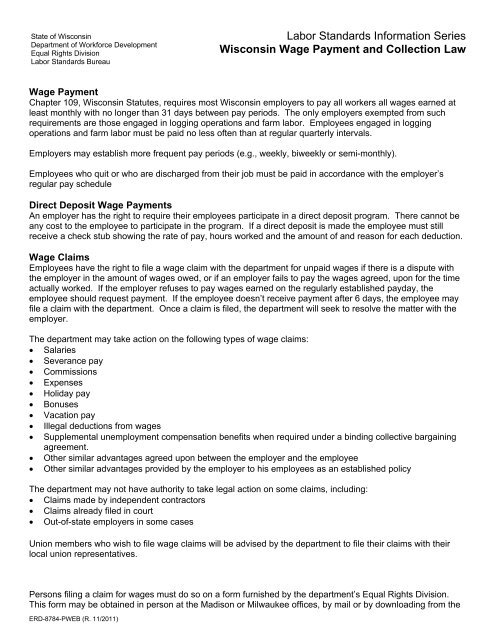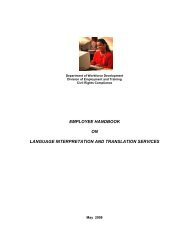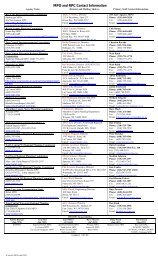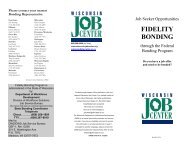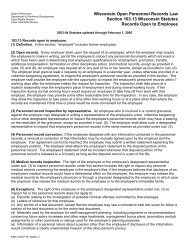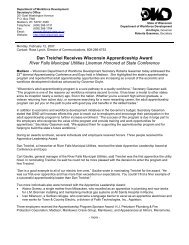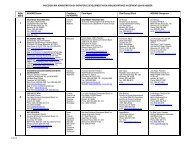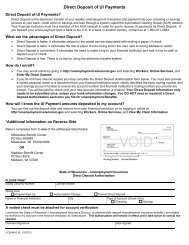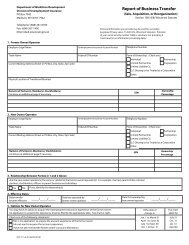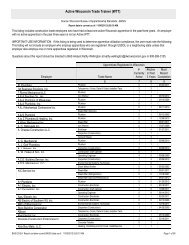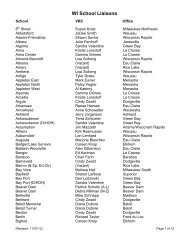Labor Standards Information Series Wisconsin Wage Payment and ...
Labor Standards Information Series Wisconsin Wage Payment and ...
Labor Standards Information Series Wisconsin Wage Payment and ...
Create successful ePaper yourself
Turn your PDF publications into a flip-book with our unique Google optimized e-Paper software.
State of <strong>Wisconsin</strong> <strong>Labor</strong> <strong>St<strong>and</strong>ards</strong> <strong>Information</strong> <strong>Series</strong><br />
Department of Workforce Development<br />
<strong>Wisconsin</strong> <strong>Wage</strong> <strong>Payment</strong> <strong>and</strong> Collection Law<br />
Equal Rights Division<br />
<strong>Labor</strong> <strong>St<strong>and</strong>ards</strong> Bureau<br />
<strong>Wage</strong> <strong>Payment</strong><br />
Chapter 109, <strong>Wisconsin</strong> Statutes, requires most <strong>Wisconsin</strong> employers to pay all workers all wages earned at<br />
least monthly with no longer than 31 days between pay periods. The only employers exempted from such<br />
requirements are those engaged in logging operations <strong>and</strong> farm labor. Employees engaged in logging<br />
operations <strong>and</strong> farm labor must be paid no less often than at regular quarterly intervals.<br />
Employers may establish more frequent pay periods (e.g., weekly, biweekly or semi-monthly).<br />
Employees who quit or who are discharged from their job must be paid in accordance with the employer’s<br />
regular pay schedule<br />
Direct Deposit <strong>Wage</strong> <strong>Payment</strong>s<br />
An employer has the right to require their employees participate in a direct deposit program. There cannot be<br />
any cost to the employee to participate in the program. If a direct deposit is made the employee must still<br />
receive a check stub showing the rate of pay, hours worked <strong>and</strong> the amount of <strong>and</strong> reason for each deduction.<br />
<strong>Wage</strong> Claims<br />
Employees have the right to file a wage claim with the department for unpaid wages if there is a dispute with<br />
the employer in the amount of wages owed, or if an employer fails to pay the wages agreed, upon for the time<br />
actually worked. If the employer refuses to pay wages earned on the regularly established payday, the<br />
employee should request payment. If the employee doesn’t receive payment after 6 days, the employee may<br />
file a claim with the department. Once a claim is filed, the department will seek to resolve the matter with the<br />
employer.<br />
The department may take action on the following types of wage claims:<br />
• Salaries<br />
• Severance pay<br />
• Commissions<br />
• Expenses<br />
• Holiday pay<br />
• Bonuses<br />
• Vacation pay<br />
• Illegal deductions from wages<br />
• Supplemental unemployment compensation benefits when required under a binding collective bargaining<br />
agreement.<br />
• Other similar advantages agreed upon between the employer <strong>and</strong> the employee<br />
• Other similar advantages provided by the employer to his employees as an established policy<br />
The department may not have authority to take legal action on some claims, including:<br />
• Claims made by independent contractors<br />
• Claims already filed in court<br />
• Out-of-state employers in some cases<br />
Union members who wish to file wage claims will be advised by the department to file their claims with their<br />
local union representatives.<br />
Persons filing a claim for wages must do so on a form furnished by the department’s Equal Rights Division.<br />
This form may be obtained in person at the Madison or Milwaukee offices, by mail or by downloading from the<br />
ERD-8784-PWEB (R. 11/2011)
Internet at this address: http://dwd.wisconsin.gov/er/. Claim forms also are available at most Job Center<br />
offices as a courtesy, but those offices do not process the claims.<br />
There is 2-year statute of limitation on the collection of wage claims. <strong>Wage</strong>s must be claimed within 2 years of<br />
the date earned.<br />
Payroll <strong>Information</strong><br />
Employers are required to state clearly on each employee’s paycheck, pay envelope of other accompanying<br />
paper the number of hours worked, the rate of pay <strong>and</strong> the amount of <strong>and</strong> reason for each deduction from their<br />
wages. A reasonable coding system may be used.<br />
The only exception occurs where the employee has requested a deduction for personal reasons. Those<br />
deductions may be labeled as “miscellaneous”.<br />
Deductions from <strong>Wage</strong>s for Loss, Theft, Damage or Poor Workmanship<br />
Employers may only make deductions from the wages of an employee for loss, theft, damage, or faulty<br />
workmanship under one of the following conditions.<br />
• The employee may authorize the deduction, in writing, after the problem occurs <strong>and</strong> before the deduction<br />
is made.<br />
• A representative of the employee may determine that the employee was at fault <strong>and</strong> that the deduction<br />
may be made or<br />
• The employee may be found guilty or held liable in a court of competent jurisdiction.<br />
An employer who makes a deduction without following one of these procedures may be held liable for twice<br />
the amount of the deduction. Blanket authorizations are not valid. The employee’s written permission must be<br />
obtained after each occurrence of a problem.<br />
Procedure for Processing <strong>Wage</strong> Claims<br />
Once a wage claim has been filed, it is necessary to gather the facts from both parties. This process is done<br />
via written responses <strong>and</strong> documentation only. The wage claim office has approximately 800-1000 claims<br />
active at any one time <strong>and</strong> it is not possible to call people once the case has been filed. Verbal communication<br />
is discouraged, as it is necessary to receive all information in writing for the file to be complete if court action<br />
becomes necessary. Even after a telephone call, you will be required to write out <strong>and</strong> send whatever<br />
information you have stated on the telephone. It will save all parties time if you send your questions <strong>and</strong><br />
information into the office.<br />
Below is a description of the process.<br />
A claim is filled out by the employee <strong>and</strong> sent to the <strong>Labor</strong> <strong>St<strong>and</strong>ards</strong> Bureau. The claim is reviewed by a<br />
specialist, <strong>and</strong>, if it is within our jurisdiction, a letter is sent to the business/employer informing them of what the<br />
employee feels they are entitled to. The employer is given an opportunity to respond to the claim either<br />
providing documentation disproving the claim, or, if the claim is valid, forwarding a check for the amount due.<br />
If a response is sent explaining why the wages have not been paid, the department reviews the information<br />
<strong>and</strong> sends it to the employee for further comment. If a check is received from the employer, it is immediately<br />
sent to the employee. The case is then closed with no penalties assessed. If no check is received, the<br />
investigator makes a determination on whether the department feels the claim is valid. If it is ruled valid <strong>and</strong><br />
the employer refuses to pay the wages due, the department may forward the claim to the local district attorney<br />
<strong>and</strong> the penalties may be assessed per Chapter 109.11. The department has no control over the action district<br />
attorneys takes. The employee must contact the district attorney after the case is forwarded, <strong>and</strong> indicate if<br />
they wish to pursue the matter to court <strong>and</strong> pay the necessary fees.<br />
Employer Retaliation against Workers<br />
An employer is prohibited from retaliating against any employee who:<br />
• files a complaint<br />
• attempts to enforce a right permitted by statute<br />
• testifies in a case, or<br />
• assists in a case
under the state’s labor st<strong>and</strong>ards laws including child labor, minimum wage, hours of work <strong>and</strong> overtime, wage<br />
payment <strong>and</strong> collection <strong>and</strong> prevailing wage rate laws.<br />
This law’s protections also apply if an employer takes an adverse employment action against an employee<br />
because that employer believes the employee has exercised any of the above rights.<br />
Persons who need further information concerning protections under the state’s retaliation provisions should<br />
contact the Equal Rights Division.<br />
Department of Workforce Development is an equal opportunity employer <strong>and</strong> service provider. If you<br />
have a disability <strong>and</strong> need to access this information in an alternate format or need, it translated to<br />
another language, please contact us is Madison at (608)264-8752 or in Milwaukee at (414) 227-4081.<br />
Filing of a <strong>Wage</strong> Claim<br />
To file a wage claim, or to obtain more information about any of these provisions, contact the department’s<br />
Equal Rights Division (except where otherwise noted) at either of these locations below OR visit our website<br />
at: http://dwd.wisconsin.gov/er/<br />
EQUAL RIGHTS DIVISION<br />
PO BOX 8928 819 N 6th ST ROOM 723<br />
MADISON WI 53708 MILWAUKEE WI 53203<br />
(608) 266-6860 (414) 227-4384<br />
(608) 264-8752 (TTY) (414) 227-4081 (TTY)<br />
Offices are open 7:45 to 4:30 p.m. Monday through Friday.


